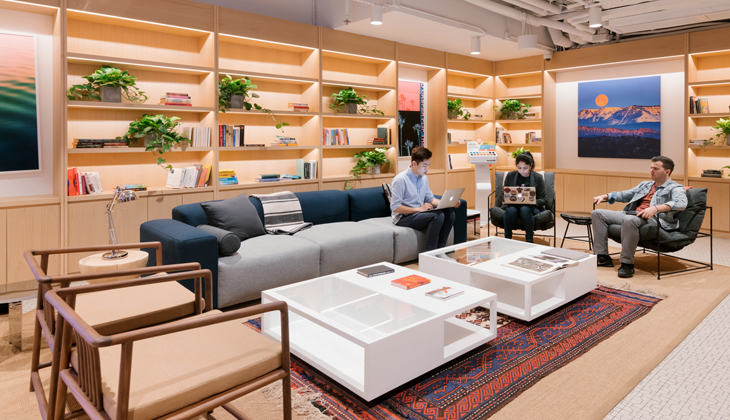The future of work: The way we work is changing — here’s how to keep up
By Alan Ai | Wednesday, 05 Jun 2019The way we work has changed dramatically over the past decade: There was a time when a good salary and health care plan were enough to attract almost any employee. Gone are office cubicles and fax machines, metal filing cabinets, and the concept of ‘clocking in.’
Looking ahead, work style will continue to evolve thanks to major socio-demographic shifts: by 2050, two-thirds of the world’s population will live in cities. Simultaneously, millennials will be the fastest growing demographic in the global workforce and are expected to take up 75 percent of the global workforce by 2025, according to the World Economic Forum.
With a new generation of employees and increasingly dense urban landscapes forcing us to rethink how we utilize space, employers will need to think carefully about how to attract and retain talent in ultra-competitive job markets as well as thinking about how to keep employees engaged, energized and valued. The millennial generation, for example, desire flexibility, community, innovation, the motivation to collaborate, and a sense of purpose — a much more holistic experience than the typical 9-to-5s of the past.
However, if enterprises want to attract young talent, they need to start by humanizing the work experience. One way to accomplish this is through the development of a sense of community across all aspects of the work experience, from social spaces to team projects, cross-team or even -industry collaborations, knowledge swaps, and convenient communication platforms.
Believe it or not, such strategies aren’t reserved just for new and nimble businesses. Enterprises recognize the added-values of moving into a collaborative space, as compared to conventional offices. WeWork’s first Global Impact Report states that 78% of enterprises members, company with more than 1,000 employees globally, said that WeWork has helped them attract and retain talent.
At WeWork locations around the world, our Community team facilitates connection and knowledge exchange between our members, including large corporations, small-and-medium-enterprises, freelancers, entrepreneurs. The Community team also helps pair up the enterprise with startups. For example, one of the world’s largest banking and financial services organizations has become a member of WeWork Hong Kong, taking up more than two floors of our private offices, to develop a social payment app that allows users to transfer money to other users instantly for free. Firstly, the bank leverages our collaborative space to house all sets of teams, including business, IT, marketing, operations, and customer services, all under one roof. The relaxed, innovative community environment offers an enjoyable and collaborative work experience, while dedicated private offices ensure there is quiet and secured space for productivity. According to WeWork’s first Global Impact Report, 80% of WeWork members globally report increased productivity since joining. Our Community team also invites the bank to host events about their newly developed product, further enhancing the brand awareness of the social payment app to a broader target audience. In fact, 54% of WeWork global members credit WeWork with accelerating their company’s growth.
Next, the bank actually teams up with startups in the community, including Notey, a Hong Kong-based content marketing platform, which is enhancing the bank’s content marketing program through an agile, multi-language platform. Through the partnership, Notey supported the bank’s blog for the social payment app to publish in three languages. Moreover, Notey also improved the bank’s contenting marketing initiatives by accelerating the schedule of publishing content, improving the agility and reducing reliance on external agencies.
Certainly, to Notey, it was a valuable partnership experience. Catherine Tan, founder of Notey, highlighted that WeWork offers a community where collaboration between members can be seamless; ideation and execution can flow between meeting rooms and communal spaces nearby to talk and catch up. The start-up benefits the most from validating their products: As a young company, collaborating with a well-known, established enterprises helps build credibility. Moreover, the experience of adopting Notey’s product with the bank ––a large enterprise environment with numerous users — has led the start-up to launch a full multi-language, high performance, China market-compatible website builder. Their product is now used by many large companies in Hong Kong and is becoming the global standard for multi-language websites.
This collaboration is certainly a win-win to both the enterprise and start-up, and it is not just a one-off. The leading global bank continues to partner with Notey following the success of their first partnership.
Whether working on new projects together or solving challenges, cross-company collaborations bring people together, inspire new ideas, and create a sense of shared purpose. As this macro shift continues to influence the way we work and live, providing the freedom and opportunity for employees to develop meaningful connections, these approaches will be key to ushering businesses into the future.

 Award winners set workplace standards
Award winners set workplace standards
 Six benefits of corporate social responsibility for your workforce
Six benefits of corporate social responsibility for your workforce
 Seven tips to land a promotion
Seven tips to land a promotion